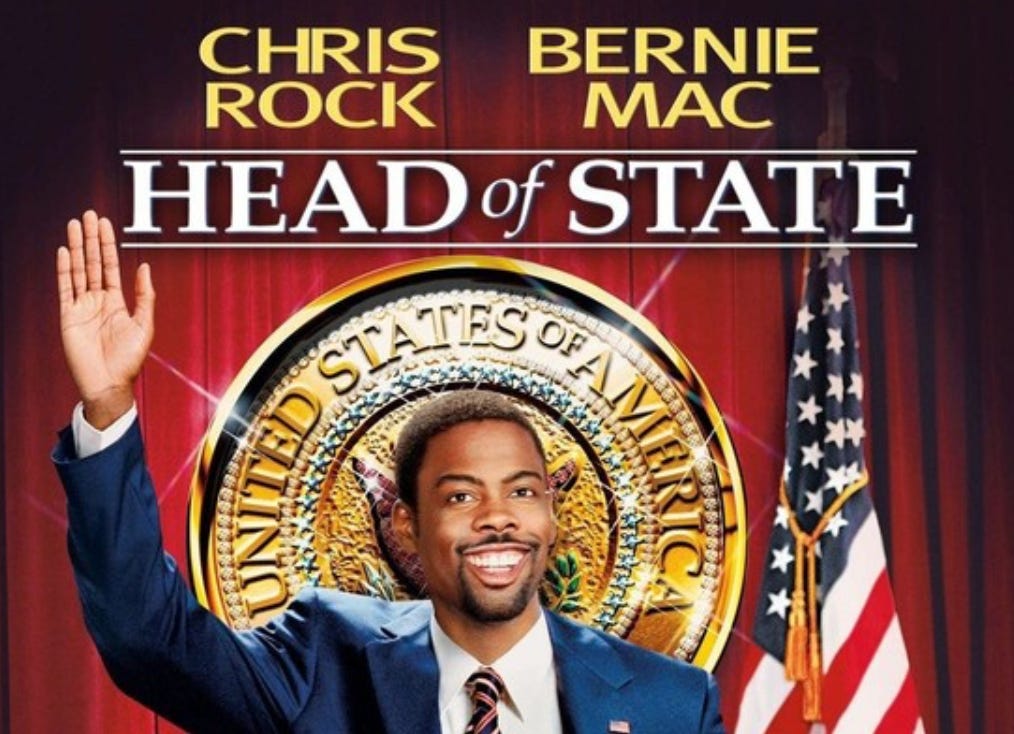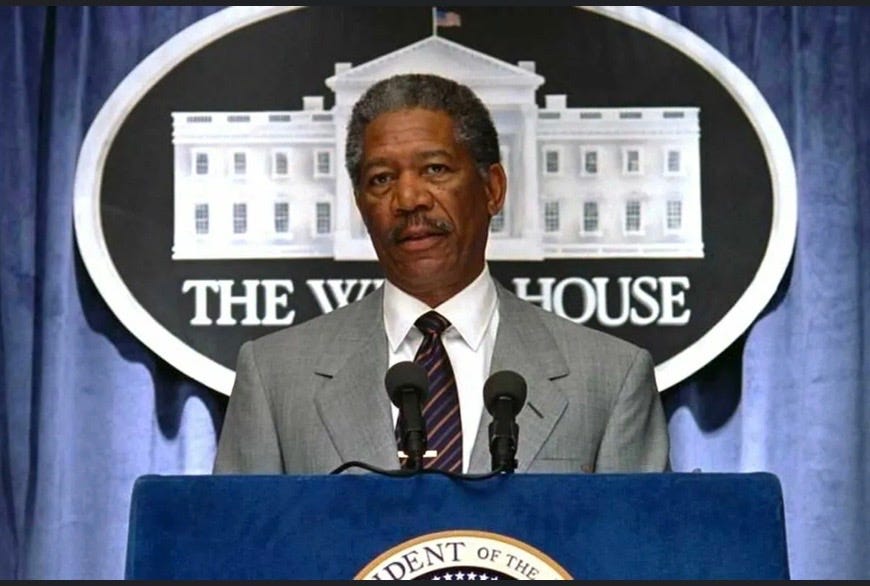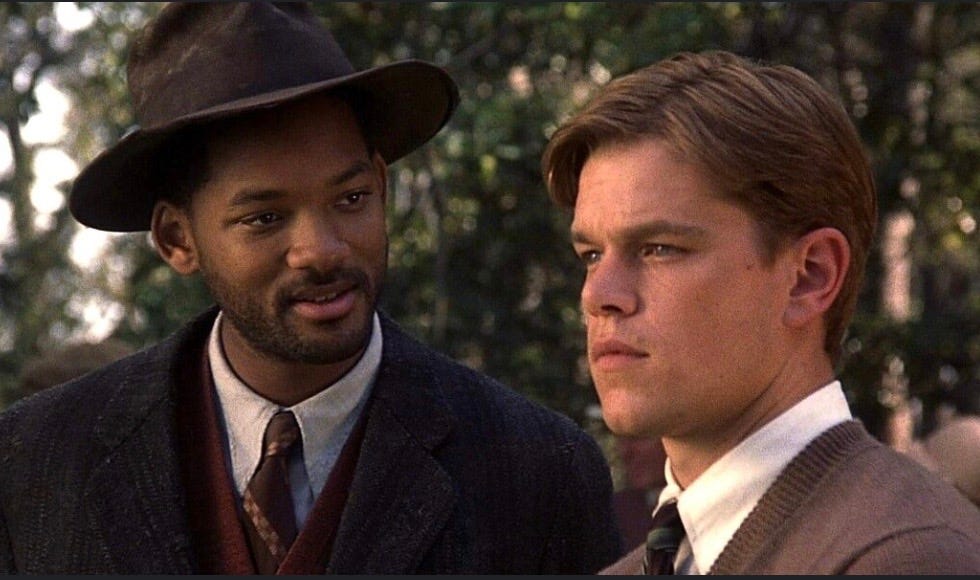Have Fictional Black Presidents Helped Elect Real Black Presidents?
All Fictional BPOTUS portrayals are either Afro-Surrealist or Hypernormalized
A lot of people are asking is the country is ready for a Black female President and I dislike the question because it’s asked in fear. It supposes that we should take seriously the opinion of bigots because they’re the ones who won’t vote for her and it’s too risky to have a candidate who part of the country won’t vote for. It’s like hey, I’m not racist but we do have to respect the opinion of racists. We can’t risk upsetting them. But at the same time, I know that if this country is ready now it’s because we’ve developed into being ready over the past decades. What has gotten us ready? One element, for sure, is popular culture.
#1 What’s Richard Pryor Got To Do With It?
That’s me and my father. He loved Richard Pryor so much that I was really young the first time I saw a Black President on TV.
In the first episode of Pryor’s short-lived 1977 NBC variety show the Richard Pryor Show (imagine Chappelle’s Show before Chappelle’s Show) there was a long, brilliant sketch where Pryor plays the first Black President.
Pryor gave his portrayal some of the seriousness and sanctimoniousness that would eventually lead to the actual election of a Black POTUS. But Pryor also gave us a healthy dose of the absurdity of the idea of a BPOTUS. All of the pop culture portrayals of BPOTUSs before Obama fall into one of two schools. Pryor touched on both of them. They all fit into either an Afro-Surrealist perspective which means they’re playing off of the difficulty of believing that there would ever be a real BPOTUS. Or they were Hypernormalized and realistic and suffused with Hollywood’s habit of extending moral authority to certain Black characters. But did Americans of all races need to see a BPOTUS to be able to normalize the concept in their minds before they could conceive of one being elected? Let me explore.
When Pryor and his writing partner, the legendary comic Paul Mooney, wrote the BPOTUS sketch, they did it in an era of a sharp rise in big cities electing Black Mayors. In the early 70s, for the first time in history, there were Black Mayors elected in Atlanta, Detroit, DC, Cincinnati, Los Angeles, and more. Widespread success at the ballot box in big cities had some wondering if maybe more was possible. Was the Presidency a possibility someday? P-Funk’s 1975 song “Chocolate City” took that dream and imagined a White House with Muhammad Ali in the Oval. But many people thought no. Things went to another level when we saw Pryor in the White House briefing room in a tasteful suit taking questions.
[I’ll post the sketch here. It’s one of the great comedy sketches of its time. You can watch it now and jump back into the essay or finish the essay and come back to the video later.]
In the early part of the sketch, Pryor plays it seriously. The character’s sanctimoniousness, his competence, his intelligence, and his chill are all funny to the audience because they’re unexpected. Like, wow, look, the BPOTUS is on top of his job!
Late in the sketch we dive squarely into the Afro-Surrealism of it all. Afro-Surrealism is entirely different than Surrealism—where the Surrealism of say, Salvador Dali bends reality into unrecognizable forms and unleashed the unconscious mind, Afro-Surrealism is art that speaks to how normal life for Black people can often seem surreal. Or how surreal artistic moments can evoke Black reality. We see Afro-Surrealism in art like Get Out, Atlanta, American Fiction, Toni Morrison’s Beloved, Ralph Ellison’s Invisible Man, Random Acts of Flyness, and Sorry To Bother You.
At the end of Pryor’s BPOTUS sketch, an entitled white Southern reporter states, in a rude tone, that the President’s mother used to be a maid. He then asks, in a tone full of sass and condescension, if the President’s mother will do his house.
The question is a way of calling him the n-word. He’s saying no matter how high you get, even the Presidency, I will still see you and your family as servants for me and whiteness. To me you’ll always be an n-word. Is it surreal that this would happen? Yes and no. You would think that people would respect the President to their face but when Obama was POTUS, during one State of the Union address, a Congressman yelled out in the middle of Obama’s nationally televised speech, “You lie!”
There wasn’t a brawl after that, but the disrespect was real. And surreal.
I talked to Marsha Warfield who was in the Pryor Show sketch
Warfield told me, “I don't think the point of the sketch was to promote the idea of a black president, but to make a mockery of how absurd it would be in this society.”
If Black people thought that a BPOTUS was an absurd idea, the stuff of Afrosurrealism, surely it was beyond the imagination of most white people. So as soon as you bring up the idea of a BPOTUS, it’s comical. That’s what people thought of the concept of a BPOTUS back then. It just shows you we needed someone to chart a new course in the collective consciousness. That someone was not Chris Rock.
#2 Chris Rock Enters The Chat
Decades later, in 2003, Rock, who styles himself as a sort of political philosopher slash comedian, wrote and directed a comedy called Head of State where he runs for the Presidency. It’s absurd. Because even in 2003, many of us still thought that that was an absurd idea. When they ask him to run for President he says “Of what?”
No one would make a movie like Head of State today but at the time it fit most people’s notions of the ridiculousness of a BPOTUS. Rock plays Alderman Mays Gilliam who’s selected to run after the Democratic nominees for President and VP die in a plane crash. He’s chosen precisely because the party thinks it cannot win this time around so why not toss in a Black person who will excite voters of color because they’re a growing demographic. The film says this explicitly. Rock, as director and creator, leans into the unlikeliness of Gilliam ever winning this race by having him campaign in track suits and a bus that’s wrapped in branding pulled from the 1990s No Limit Records playbook. It’s like, my chance of winning is low so I might as well be as Black as I want to be. At a debate when asked about how to deal with kids being on screens too often, Gilliam says, parents should “knock them out.” What? The film fully embraces the absurdity of his campaign by having his Black female advisor tell him, “You’re here to lose, Mays. They picked you so you could lose. If they really had any idea that they could win this thing do you think they would’ve picked an ignorant ass nigger like you?”
She used the hard -er. That’s what they thought of him.
Of course, in the end, Gilliam wins, because it’s a Hollywood movie, but this is the sort of portrayal that would fit for anyone who thinks a BPOTUS is absurd. But there were others portrayals that helped us start viewing things differently.
#3 Morgan Freeman Could Make You Believe That God Is Black
When we’re watching a film and we’re really in the grip of it, like really enmeshed in it, like especially when you go to the movies or you’re at home really focused on a show and you’re not doing anything but watching, that’s when the mind’s eye kinda finds it hard to distinguish between the film and real life. You know it’s a movie, you know that they’re actors, and yet you care about what happens so much that your body has physical reactions to what you’re seeing. Your heart may race at romance, your palms might sweat at horror, you react as if what you’re seeing is real. In his new documentary Hollywood Black, director Justin Simien argues that “whoever controls cinema controls history,” because the stories and characters we see can shape how we perceive the world. In a world where we are inundated with images of white male Presidents for decade after decade, the mind accepts the notion that white men should be President. The mind says hey when we think about Presidents the only images that come up are white men because that’s all we’ve ever seen. We needed to see Black Presidents before we could truly conceive of it as something realistic.
One of the films that may have made a difference by giving us a Hypernormalized BPOTUS—thus normalizing the idea of a BPOTUS as a realistic one in the American collective consciousness—was Morgan Freeman’s President Tom Beck in 1998’s “Deep Impact.”
In this disaster film there’s two comets on a collision course for Earth and if we cannot stop them, billions will die and life as we know it will end. You know the drill. President Beck is not the central character, but he is a crucial one. With the future of the world in serious doubt, he looks into the camera and is the calming influence the world needs. He’s the man in charge during an insane crisis and we feel comforted and reassured by his leadership. He is competent, capable, cool, calm and collected. [I did not intend to write a quintuple alliterative there but somehow it worked.] This is the sort of emotional leadership that we want from a President. Morgan Freeman, who always brings dignity and depth to his characters, imbues his BPOTUS with a seriousness that says to us, yes, it would make sense to have that man in charge. But part of what Freeman is leaning on in that portrayal is something that goes back decades in Hollywood—the Magical Negro.
The Magical Negro is a character who is Black, wise, and there to help a younger white person who needs guidance. Think of the Legend of Bagger Vance.
The Magical Negro is imbued with a sense of moral authority, as if his or her Blackness—and their dignity in spite of oppression—makes them a symbol of morality. They are supposed to be a deeply good person who is worthy of being listened to. They are the embodiment of wisdom and they are there to save the white lead. Morgan Freeman’s calming, soothing Black President is perhaps a cousin of the Magical Negro because he’s that wise, moral figure who’s here to help everyone through a crisis. Seeing Freeman’s President, it’s like, oh yeah, that could work. A Black President could work.
#4 Dennis Haysbert Incepted America
A few years after Deep Impact came a hugely popular weekly TV show on Fox with a cool, calm, collected Black President who many think did a lot of the work to open up the public’s mind to the idea of a BPOTUS. The show was 24. Dennis Haysbert played President David Palmer and watching him now, he really does give us Obama before Obama.
Palmer was President for three seasons, from 2003 to 2005, and during those three seasons over 10 million people watched every episode. That’s a lot of people getting the image of a competent, trustworthy, seriously Presidential Black man beamed into their living rooms—and into their minds—once a week. I am sure that literally seeing him play the President helped incept people into believing in the possibility of a Black person as President. Because of Haysbert and 24, millions of people had seen it. Call it the Haysbert Effect.
Sadly, there isn’t much of a record of Black women POTUSs in popular culture.
There was Alfre Woodard on State of Affairs but that was a one season show that few people watched. But I think once Obama broke the mental glass ceiling in the collective consciousness and showed us that the President doesn’t have to be a white man, we could never turn back. Once the country can conceive of a Black President, they know that a Black female President can happen. They may never be ready as far as wanting to accept it but after Obama, everyone knows it’s in the realm of possibility.
Once we saw that the President doesn’t have to be a white man, we can never unsee it.
If Palmer’s fictional Presidency made it easier for Obama to win, then Obama’s win made it easier for Kamala to win and her win will make the road a little easier for someone else from a marginalized group that is considered unelectable right now but one day, for sure, they too will win.
If you think the fictional portrayals of Black Presidents made a difference for Obama and Kamala, let me know in the comments. And if there’s an important fictional portrayals of a Black President that you think influenced people, let me know.










